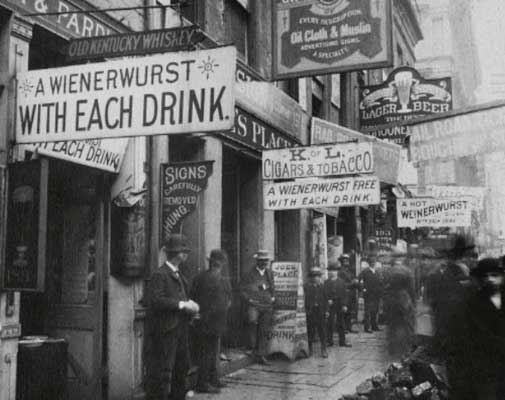
HBO's Boardwalk Empireis, of course, a visual triumph, with the art direction up front and center as a major character in the series. Wardrobe, interiors, automobiles and product design are done with so much attention to detail, we can palpably sense the time and day of Atlantic City political boss and racketeer Enoch L. "Nucky" Thompson (Steve Buscemi) and his crooked empire.
Turns out, the new Ken Burns documentary for PBS, Prohibition, confirms all that mayhem and corruption, in a sweeping new look at the 1920s law, and what came before -- and after...
As in his previous documentaries, Burns' Prohibition (televised Sunday-Tuesday, Oct. 2-4, at 8 p.m. ET on PBS; check local listings) digs into the story through old news clippings, photographs, and grainy black-and-white film that ground us in the look and language of the day. It's a technique uniquely his, and it doesn't become tired. Time and again, it connects us with a culture and style that was truly American, and is now long gone.
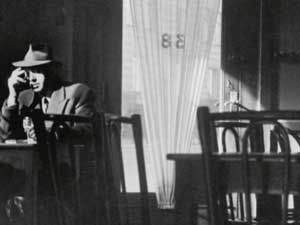
Many of the stills and clips gathered together by co-directors Burns and Lynn Novick and the rest of the Prohibition team are fine-arts-level work by the photographers of the day, and make for a rich, chiaroscuro experience spanning nearly six hours, presented in three parts. Running on consecutive nights, they're entitled "A Nation of Drunkards," "A Nation of Scofflaws" and "A Nation of Hypocrites."
As a body of research, it's a very thorough look at the evolution and dismantling of a law that had urgent origins, but out-of-control consequences. Initially meant to protect women and families from rampant saloon culture and alcoholic violence, Burns, Novick and writer Geoffrey C. Ward make the point that the prohibition laws did indeed reduce alcoholism rates, and kept many women and children from harm and abandonment.
But the practice of the law was rife with uneven application, starting with alcohol being legally dispensed by pharmacies as medication, speakeasy nightclubs regularly ignored and allowed to operate, and individuals legally allowed to ferment wine for their own use at home.
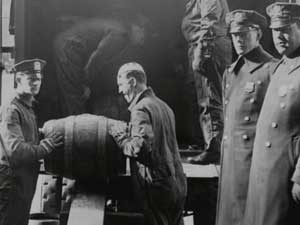
Politicians regularly scorned the use of alcohol in public, but openly drank with cronies behind closed doors. (See also: Boardwalk Empire.) And the federal government grossly under-funded enforcement of the law from the start, often admitting that it was virtually impossible to enforce on a nation-wide basis. Later, though, it did fund a very aggressive prosecution unit, led by Mabel Walker Willebrant, known as "The First Lady of Law."
Perhaps most surprising, in this documentary, is an explanation of how the U.S. Constitution was amended -- not once, but twice -- in a span of 13 years, to enact, then abolish, a federal law. That's all the more startling from the viewpoint of today, considering the current level of political discourse in the U.S. Congress. Virtually nothing today can be agreed on by both parties, much less an amendment to the Constitution.
Prohibition follows the twists and turns of the 13-year run of the law, often framing it most notably as a cultural standoff between the church-going dry country folk and the secular city dwellers full of immigrants.
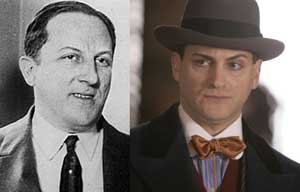
Many of the more infamous characters from that time are here, with Al Capone appearing in the second half of part two, along with one of the main characters from Boardwalk Empire, the New York City kingpin, Arnold Rothstein. (In the accompanying picture, the real Rothstein is at left; the actor playing him in Empire, Michael Stuhlbarg, is at right.) Rothstein and other national crime bosses controlled not only the flow of booze, but the buyers, police and politicians around it.
However, the leading character of Empire, Buscemi's "Nucky," is nowhere to be found -- perhaps because he's too far down the chain of the real story to get a footnote. (Though the character is given the last name of Thompson in the HBO series, the real "Nucky" was named Johnson -- though both share the same unusual first name of Enoch, from which the nickname "Nucky" derived.) Apparently, he's well below George Remus, a Cincinnati lawyer turned bootlegger and regional dictator.
Remus bought drug companies, defunct breweries, trucking companies and warehouses, and got permits to sell alcohol for legal prescription use. Under the protection of that letter of the law, he became one of the biggest bootleggers in the country, paying off cops and judges in thousand-dollar bills. On a good day, the operation grossed $80,000, an astronomical number for a local operation, even by today's standards.
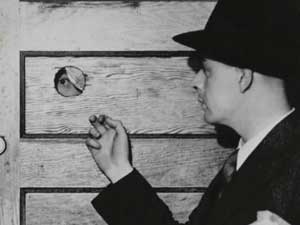
Although it never states so in any overt terms, Prohibition is quite clever and poignant as an indirect commentary on the legalization of drugs in today's society. The issues are much the same: was alcohol abuse then, like drugs today, a problem of addiction to be treated by the social community, or something to be punished by criminal law?
Prohibition recounts how the re-legalization of alcohol dispensed with the obscene profit of bootlegging, and its attendant corruption and violence. The clogged courts could be cleared of cases of individuals breaking the law because of private use. The government profited by taxing it, and its production could be regulated and made safe. Treatment for alcoholism came to be studied. AA was born.
If Prohibition isn't a direct analog for our current dilemma on drugs and morality, it certainly demands a different look at our time, through the historic lens of a campaign on an illicit substance that lasted 13 years, with more failure than success.
Journalist Pete Hamill, a 30-years-plus recovering alcoholic and author of A Drinking Life, is a central commentator on the show, and he muses on Prohibition's attempt to legislate morality, and its unintended consequences.
If you want to increase the appeal of something, he says, make it forbidden. "If you want kids to brush their teeth," he says, "make toothpaste illegal. It's human nature."